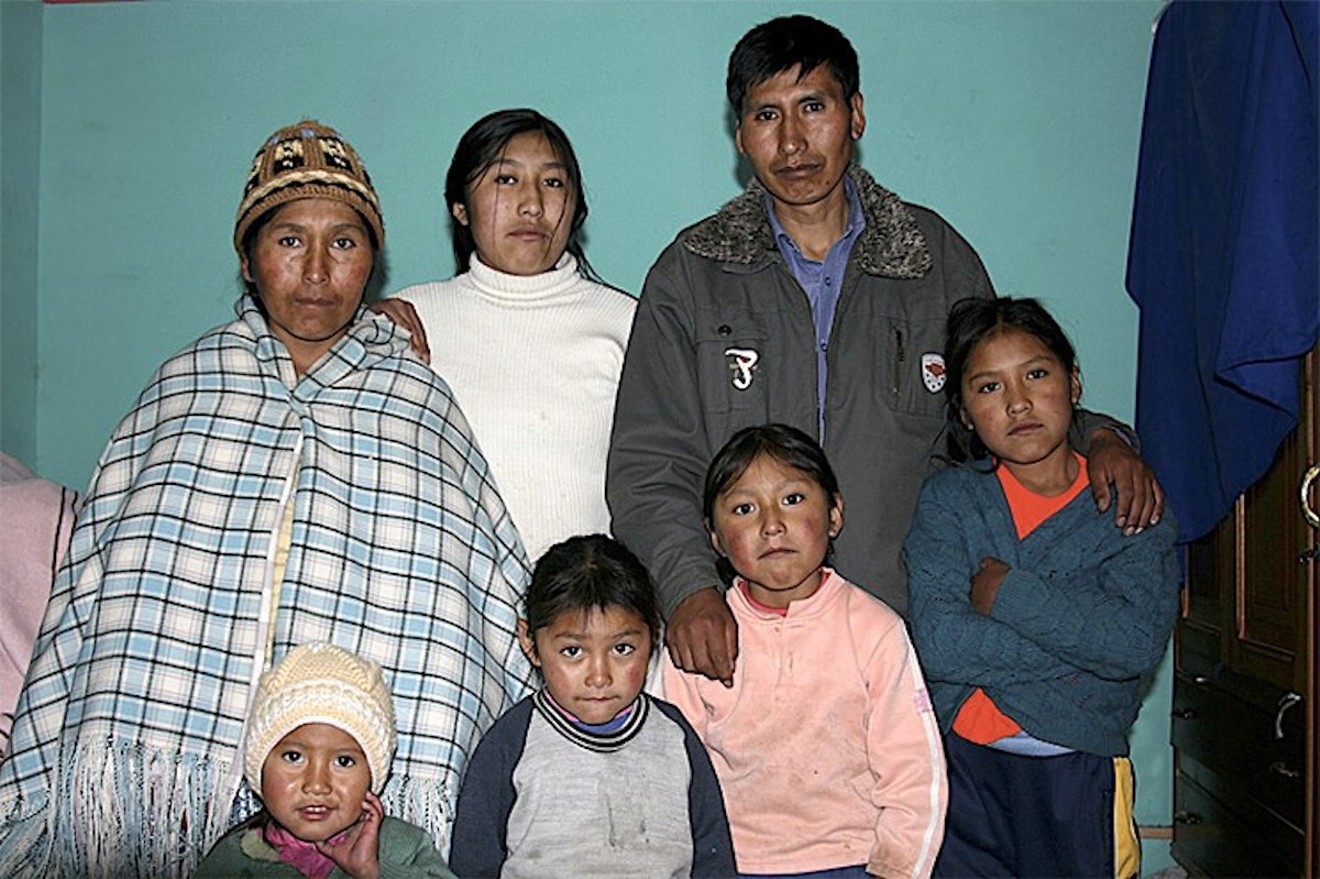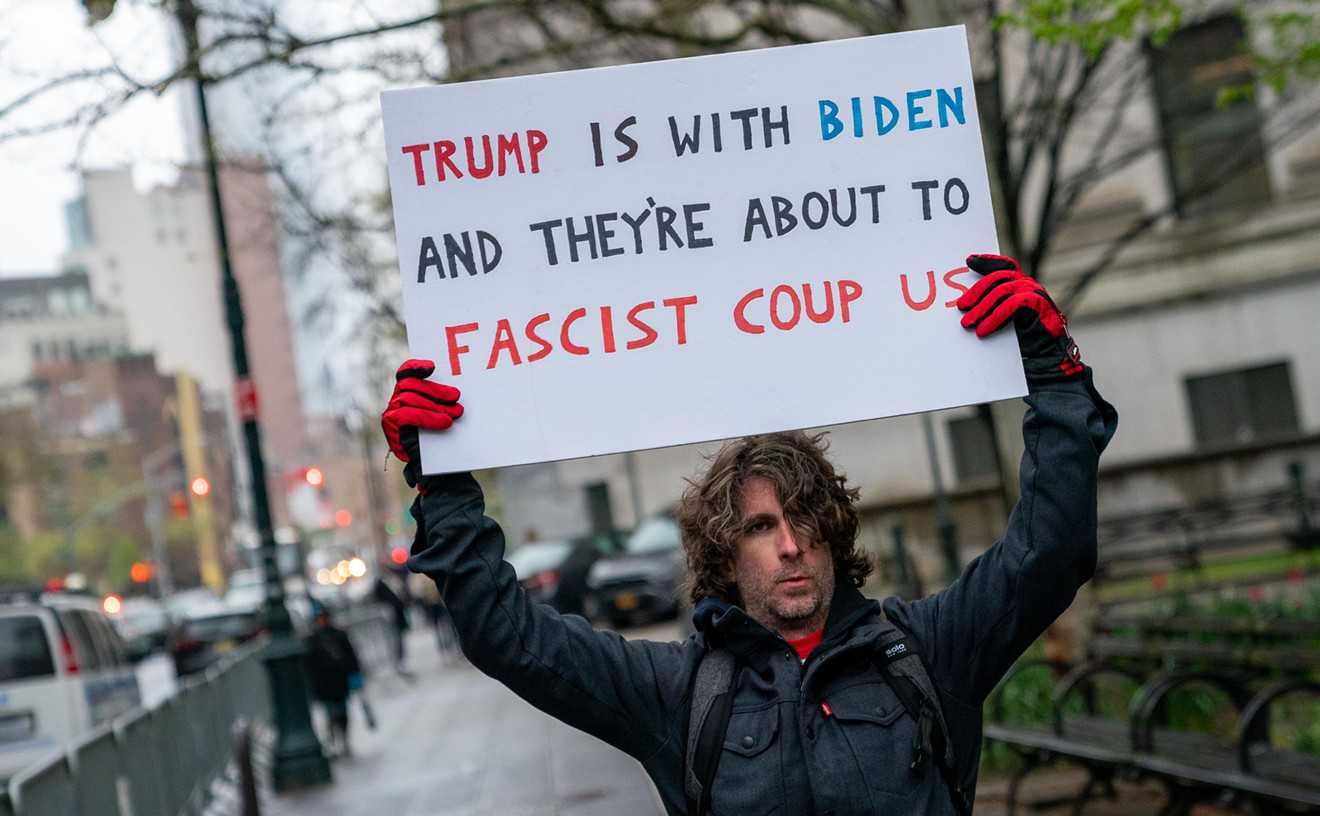Note: This story has been updated with coverage of today's court hearing in Miami.
As Etelvina Ramos Mamani recovered from giving birth in her home in the rural highlands of Bolivia, a military sharpshooter fired a single bullet through her small bedroom window, striking her 8-year-old daughter Marlene in the chest. The woman held her daughter as she died.
The 2003 killing was one of many atrocities committed during a period of unrest in Bolivia sparked by the government's exploitation of the country's natural gas deposits. During the nation's "Gas War," military forces used deadly force against civilians — injuring hundreds and killing 67 people, mostly of the Aymara indigenous community.
Mamani and her husband, Eloy Rojas Mamani, have been seeking justice for their daughter since her death. They were back in court in Miami today as plaintiffs in a 2007 civil lawsuit filed against former Bolivian President Gonzalo Sánchez de Lozada and Defense Minister José Carlos Sánchez Berzaín. In the lawsuit, Marlene's parents claim the men authorized and directed the deadly suppression of protests. The officials fled Bolivia in October 2003 at the height of the conflict and have been living in South Florida since then.
After years of legal battles, attorneys for Marlene's parents are seeking reinstatement of a $10 million judgment finding the former president and defense minister responsible for the killings. A federal jury in Fort Lauderdale unanimously found the officials liable for the slayings and awarded damages to the families of eight victims in April 2018. But the judge, saying the evidence presented during the monthlong trial wasn't enough to sustain the verdict, later overturned the jury's finding.
The victims' families appealed the judge's decision, and their attorneys presented oral arguments before three judges this morning in the Eleventh Circuit Court of Appeals.
"We are asking the court to reinstate the jury verdict," says Beth Stephens, an attorney for the Center for Constitutional Rights, a nonprofit legal advocacy organization that has been litigating the case together with the International Human Rights Clinic at Harvard Law School and various private firms.
The trial marked the first time living former heads of state faced charges of human-rights violations and sat in a courtroom with their accusers, according to the Center for Constitutional Rights.
The former president and defense minister have denied liability in court records. The former president went as far as to blame Evo Morales, whose rise to power was fueled by the protests. Morales, who was president of Bolivia for nearly 14 years following Lozada's ouster, was forced to resign November 10 after hijacking the country's election. Jeanine Áñez, the second vice president of the senate who has previously tweeted anti-indigenous sentiments, declared herself the interim president of Bolivia this past November 12.
Lozada governed Bolivia from 1993 to 1997 and again from 2002 to 2003. Court documents say his rule was marked by the violent suppression of anyone who criticized his government over his policies and economic programs.
"Lozada's administration used military force to silence opposition and intimidate the civilian population, particularly poor and indigenous people," the 2007 civil lawsuit reads.
In early September 2003, rural villagers gathered around the city of El Alto, neighboring La Paz, amid ongoing demonstrations to protest a controversial local tax, the detention of a community leader, and the sale of the nation's gas to foreign corporations, according to the lawsuit. Some 15,000 villagers marched toward the country's capital. As their numbers grew, labor and community groups organized street protests and civil strikes, blocked major highways, and halted traffic. The former president and defense minister mobilized the military and police, the lawsuit says.
The military arrived in Warisata, the rural town where the Mamani family lived, in the early-morning hours of September 20, 2003, and shot tear gas into a small crowd of people protesting in the street. The military chased unarmed protesters and fatally shot several of them. That afternoon, 8-year-old Marlene peered out the window of her mother's room. The bullet that pierced her chest lodged in the wall behind her, and she fell onto the bed where her mother lay with the newborn.
The resulting court case has been ongoing for more than a decade. It's been a long haul for the families, who lost wives, husbands, unborn children, and siblings to indiscriminate violence. They continue to hope their country's former leaders will be held accountable for their actions.
"Stepping back, I think how remarkable it is what they’ve done," Stephens tells New Times. "They've handled every part of it with incredible courage."
Outside the courthouse, Eloy Rojas Mamani, had a message for Bolivia's former president and defense minister.
"Let them try and escape to any corner of the world," Eloy Rojas Mamani told New Times. "As Marlene's parents, we'll seek justice anywhere."
He says they won't accept anything less. In a few days, Mamani and his wife, Etelvina Ramos Mamani, will return to Bolivia. He'll go back to his construction job, and she'll continue cooking and selling traditional meals. They'll think of their daughter, as they have every day since she was shot.
Eloy Rojas Mamani says he splits time between La Paz and the rural village where his family lived during the massacre. He visits his daughter's grave and takes flowers as often as he can.
"Going to see her gives me strength and courage," he says.
He feels the responsibility of what he and his wife are fighting for: "For no government to ever again kill an Aymara."
[
{
"name": "Air - MediumRectangle - Inline Content - Mobile Display Size",
"component": "19274298",
"insertPoint": "2",
"requiredCountToDisplay": "2"
},{
"name": "Editor Picks",
"component": "17482312",
"insertPoint": "4",
"requiredCountToDisplay": "1"
},{
"name": "Inline Links",
"component": "18711090",
"insertPoint": "8th",
"startingPoint": 8,
"requiredCountToDisplay": "7",
"maxInsertions": 25
},{
"name": "Air - MediumRectangle - Combo - Inline Content",
"component": "17482310",
"insertPoint": "8th",
"startingPoint": 8,
"requiredCountToDisplay": "7",
"maxInsertions": 25
},{
"name": "Inline Links",
"component": "18711090",
"insertPoint": "8th",
"startingPoint": 12,
"requiredCountToDisplay": "11",
"maxInsertions": 25
},{
"name": "Air - Leaderboard Tower - Combo - Inline Content",
"component": "17482313",
"insertPoint": "8th",
"startingPoint": 12,
"requiredCountToDisplay": "11",
"maxInsertions": 25
}
]












